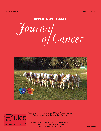Lifestyle habits as prognostic factors in survival of laryngeal and hypopharyngeal cancer: A multicentric European study
Abstract
Little information is available on the role of tobacco, alcohol and diet in the survival of upper aero digestive cancers. Our study analysed the survival of 931 laryngeal and hypopharyngeal cancer patients, enrolled in a population based case-control study conducted at 5 centres in southeast Europe during 1979–1982. Age at the time of diagnosis and site of origin of tumour were observed to be predictors of the survival. Cigarette smoking, and to a limited extent alcohol drinking, before the diagnosis of tumour seem to influence the overall survival whereas high intakes of vegetables and vitamin C were observed to favourably affect the prognosis. For mortality from upper aerodigestive cancer protective effects of high intakes of vegetables, fibres and vitamin C were observed. Our results support the hypothesis that there is a role for dietary intervention to improve survival of laryngeal and hypopharyngeal cancer patients. © 2005 Wiley-Liss, Inc.




